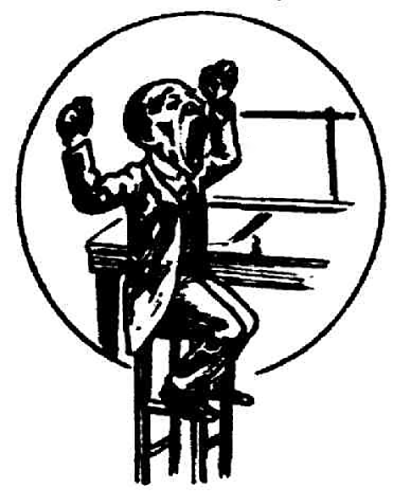The colloquial and humorous noun Mondayitis denotes reluctance to attend school or work, or a reduction in working efficiency, experienced on a Monday morning.
—Cf. also How ‘blue Monday’ came to denote a gloomy Monday.
The noun Mondayitis is composed of Monday and of the suffix -itis. Used to form names of inflammatory diseases, such as appendicitis, bronchitis and tonsilitis, the suffix -itis has come to be also applied to a state of mind or tendency fancifully regarded as a disease.
The earliest occurrence of Mondayitis that I have found is from the Bristol Times and Mirror (Bristol, England) of Saturday 16th May 1908:
BATH AND WELLS DIOCESAN CONFERENCE, 1908.
FROM AN OCCASIONAL CONTRIBUTOR.The Bishop gave an explanation in his address, on the second day of the Conference, of the reasons that had brought about the unwelcome necessity of meeting on Monday and Tuesday, instead of on the more usual days, Tuesday and Wednesday. The “Pan-Anglican” Conference, as it is hideously called, has produced, it would seem, a disturbance of the ecclesiastical atmosphere in this present extraordinary spring, characterised by as many other objectionable meteorological abnormalities. When winter falls into the lap of May, almost anything may be expected. St. Monday is the parson’s rest day. Sometimes he is visited on that day with a complaint unknown to the medical profession— Mondayitis—and, after the fatigues of his previous day’s work, he feels it irksome and hard to be summoned to hear a sermon in the Cathedral from Prebendary Boyd, of Bath, or any other prebendary or preacher.
The second-earliest occurrence of Mondayitis that I have found is from The Weekly Advocate (Victoria, Texas, USA) of Saturday 5th September 1908:
CATTLE RECEIPTS.
San Antonio Express.
The receipts of cattle for 1908 up and including last Tuesday at Chicago, Kansas City, Omaha, St. Louis, St. Joseph and Sioux City were 4,760,000 head, as compared with 5,529,000 head for the same period in 1907. A shortage of 770,00 cattle does not seem to be doing the producer any good just at present. The fed native steer is not bringing enough money for the reason that the shippers seem to have a very aggravated case of Mondayitis, as the big end of the receipts arrive on that day.
Mondayitis then occurs in the following from The Sunday Times (Sydney, New South Wales, Australia) of Sunday 18th September 1910:
MALINGERING IN THE PUBLIC SERVICE.
HAVE YOU “MONDAYITIS?”
(“Sunday Times” Special.)“The man who wilfully pretends that he is ill in order to stay away from work is a rare exception in the Civil Service of this State.”
This answer was given to a “Sunday Times” representative by the Secretary of the Public Service Board yesterday, in answer to a question as to whether malingering was as rife in the Civil Service of the State as it is in the Federal Service, as implied by the recently issued report of the Federal Public Service Commissioner.
[…]
“There is a new complaint creeping into the service as well as into other employment,” remarked an officer during the course of an interview yesterday. “You probably have not noticed it yet, but we call it ‘Mondayitis.’ It is a kind of semi-physical exhaustion following on a rather strenuous Saturday and Sunday. Men come into work at the beginning of the week more or less done up. Occasionally they are too exhausted to come to work at all. It has become more or less noticeable during the last year or two. My only fear is that if the idea of spending Sunday in the open continues to develop as it has of late years, it may be necessary to set aside Monday as a day of general recovery, prepatory [sic] to entering upon the work of the week.”
The use of Mondayitis in the above-quoted article published in The Sunday Times gave rise to Sundayitis in the following from The World’s News (Sydney, New South Wales, Australia) of Saturday 1st October 1910:
“Mondayitis,” a Sydney paper reports, is what some officials and others in large employments are sometimes afflicted with, to the end that they are below par on resuming work after the Sunday spell. “Sundayitis” would be a better name for it, apparently, for it is the Sunday that does the damage. On Sunday the carefree citizen wanders wide, has a good, strenuous time, and has the tired feeling by Monday morning.
An office worker suffering from Mondayitis—from The World’s News (Sydney, New South Wales, Australia) of Saturday 1st October 1910:

The variant blue Mondayitis occurs, together with red Saturdaynitis, in the following paragraph, published in The Gazette Times (Pittsburgh, Pennsylvania, USA) of Wednesday 19th November 1913:
Logical.
Brooklyn Times.
A physical director says that “blue Mondayitis” is as much of a distinct and definite disease as pneumonia or the measles. It is the outgrowth, he claims, of high tension life in New York. Sometimes, we fear, it is the direct result of “red Saturdaynitis.”
